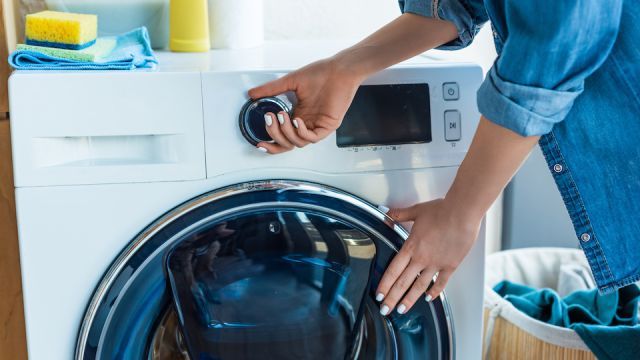
Why would you need to clean a washing machine? Doesn’t all that water and soap sloshing around keep it clean and fresh? Actually, no. Your washing machine cleans your dirtiest laundry. And while your clothes may come out clean, they leave behind nasty gunk. Over time, that gunk can build up and “wreak havoc” on your laundry and home – and even your life. Here’s what happens if you never clean your washing machine.
Superbugs could thrive
If you’ve ever purchased a new high-efficiency washing machine, you may have noticed that over time it just doesn’t smell as fresh as your older, less-efficient model. That’s because today’s high-efficiency washing machines wash at lower temperatures, allowing bacteria to survive the wash cycle. And we’re not just talking a little harmless bacterium; we’re talking about a multidrug-resistant bug.
After inspecting the clothing of 13 newborns in a neonatal intensive care unit at a German children’s hospital, researchers found traces of a multidrug-resistant pathogen on the surface of the clothing. The bacteria apparently passed onto the clothing from previously washed knitted hats and socks — items used to keep the babies warm.
Research reported in the journal Applied and Environmental Microbiology concluded that the culprit was the “household-type” washing machine used to launder the clothing. It was thought that the final cold-water rinse, which didn’t use detergent, may have allowed the resistant bacteria to flourish. Another culprit may have been the condensed residual water trapped on the rubber seal of the door. Anyone with a high-efficiency front load washer has likely noticed that gunk that collects in the seal.
Luckily, the babies were only exposed to the drug-resistant pathogen but not actually infected, according to the researchers.
Bacteria-trapping gunk
When you don’t clean your washing machine, gunk made up of soap residue, fabric softener, minerals, and chemicals builds up, creating a thin film that can trap bacteria. Bacteria tend to live in the detergent drawer, rubber seals around the door, and the washing drum. Plus, since 43 percent of North Americans use cold-water washes, that gunk isn’t going anywhere.
As a result, bacteria-laden buildup can further move into the drum mechanism, thus preventing the water from getting hot so that it can do its job. Plus, your washing machine, by design, is dark, which creates a hot and humid environment — making it a perfect breeding ground for bacteria to thrive.
Smelly clothes, smelly you
Maybe not as dangerous, but just as distressing, is pulling clean clothes out of the washer only to discover that they reek of mold. Beyond body odors that may not have been washed completely out of your clothes due to cold water washes, you could be facing some serious mildew problems in your washer. Sure, heavily perfumed detergents and additives can mask those stinky odors, but once fragrance additives fade, they become noticeable again.
Not removing wet clothes right away, plus the residue left behind from liquid fabric softener may cause those malodorous scents. Additionally, not wiping around the door and around the gasket regularly can cause mold and mildew in your machine.
How to clean your washing machine naturally
Apple cider vinegar in your washer is a great way to keep your washing machine clean and odor-free from bacteria and mildew. To clean your washing machine:
- Add two cups of apple cider vinegar into an (empty) wash cycle. If you have a cycle designed to clean your washer, use that. If not, then simply run the vinegar through a regular wash cycle (without any laundry in the tub).
- Next, mix together in a bucket: One-part apple cider vinegar and four parts warm water. Use a clean sponge to hand-wipe around the door and around the gasket. An old toothbrush works great for the detergent and fabric softener dispensers and any tight areas around the door.
For extra stinky clothes, add one cup of apple cider vinegar to your laundry load to remove germs and keep your laundry odor-free.
Note: When it comes to COVID-19, vinegar is not enough. The CDC provides a complete guide on how to clean and disinfect for coronavirus.
Keep mold and mildew at bay with tea tree oil
Tea tree oil known for its antiseptic and antiviral properties and is great for keeping mold and mildew at bay. Keep a spray bottle with diluted tea tree oil (one teaspoon tea tree oil with one cup of water) by your washing machine. Leave for a few minutes and then wipe with a clean sponge or cloth. For more soiled areas, use paper towels.
The nitty-gritty
It may seem like your washer is self-cleaning because of all that soapy water sloshing around inside — but it isn’t. Your machine washes your dirty clothes, bedding, curtains, towels, and more. Collecting dirt, bacteria, and even fungus. Over time, if you aren’t cleaning your washing machine, you could have a stinky problem on your hands, or even worse, pathogens breeding on your clothes. In the end, washing your machine makes perfect sense and could be a simple step towards improving your physical wellbeing.
-Katherine Marko

